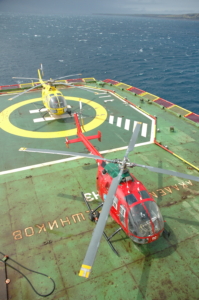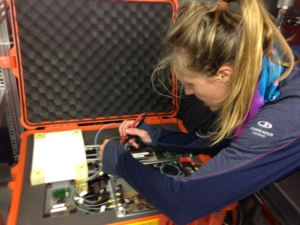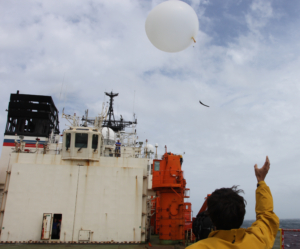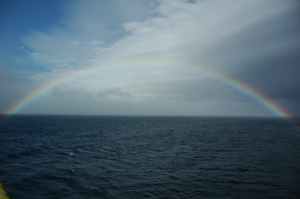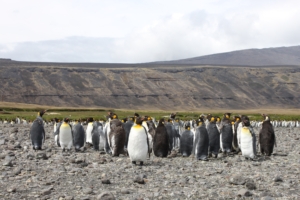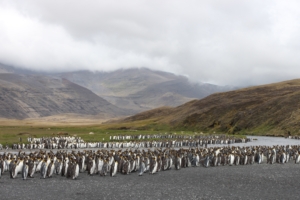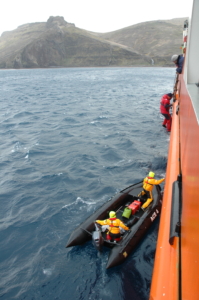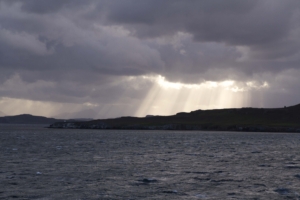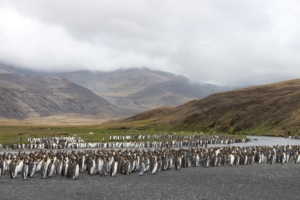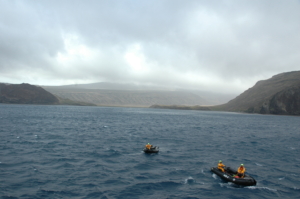A day in the life of a researcher on the Antarctic Circumpolar Expedition
05/04/2017
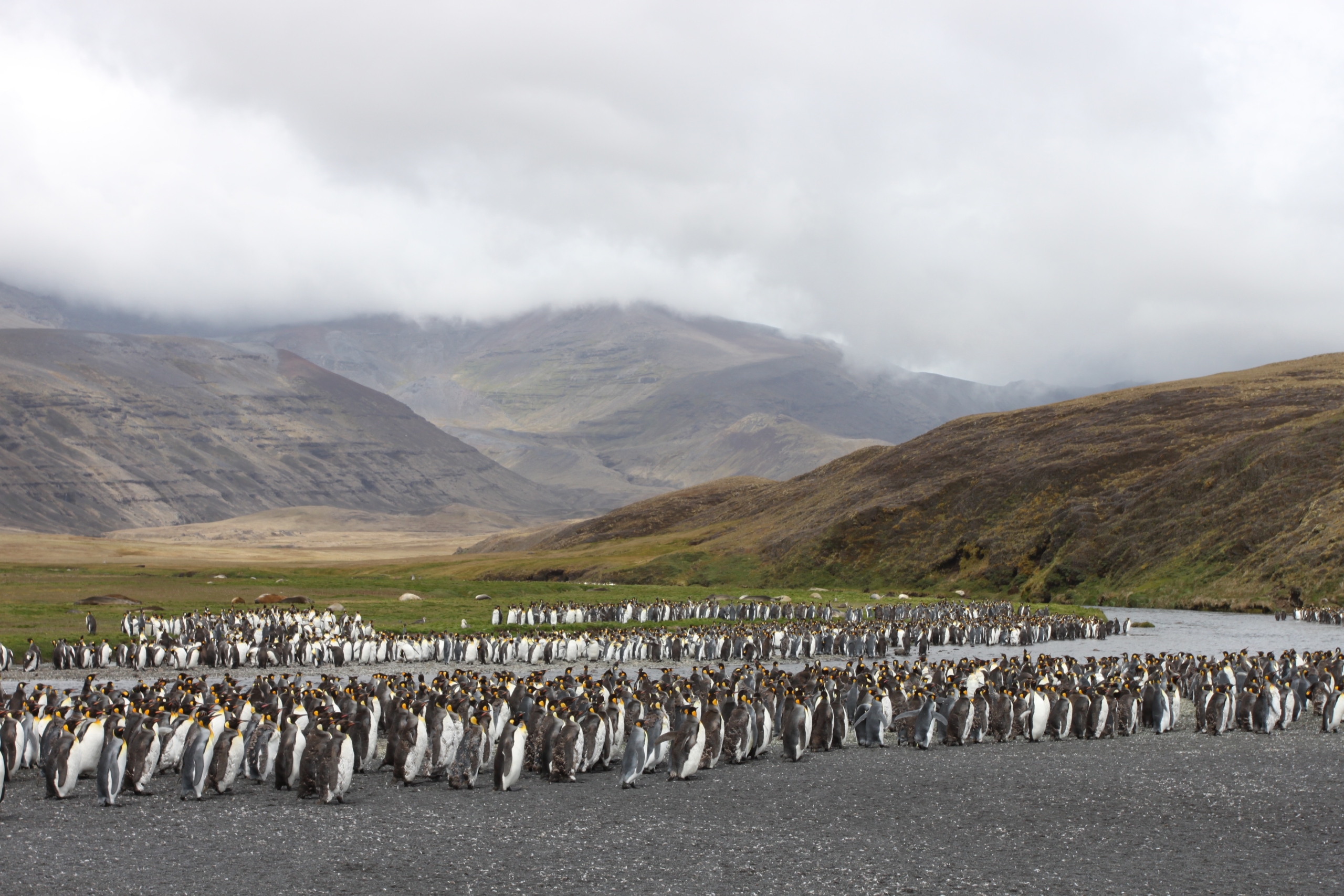
After the first few days on board the Akademik Treshnikov (a research vessel that has just completed it’s circumnavigation of the Antarctic Continent), and once the maze of stairwells and heavy doors have been explored, one finds a new rhythm of life. A rhythm uninterrupted by emails, internet, or phone calls, where there is time to get to know the more than 50 fellow scientists on the first leg of the Antarctic Circumpolar Expedition.
The morning of 31 December and there is excitement abounding – we have arrived at a remote group of French islands we are to stop over at, the Crozet Islands. The view from our cabin porthole is of icy sparkling blue waters and steep volcanic slopes. Those lucky enough to have land-based science projects are supposed to use the helicopters, but the gossip that flies around the ship (like wild fire when you find yourself without messaging apps!) is that it’s too windy to fly – those to go onshore are to wait. An hour passes, more news and it seems it’s possible to take the dinghies. Just a few minutes later and supposedly the helicopters will fly. There is chaos on board with some teams in survival suits all ready to jump into the dinghies and others ready to take off with the helicopters. In the end it all worked out and everyone who needed to get to the island managed to find a way there (and back!)
While some of the teams are on the island collecting samples (and saying hello to the penguins too!), the rest of us remain on board. This morning I’ve got plenty to do – some data analysis as well as some tests on the instrument I’m looking after, the iDIRAC developed at Cambridge and Cranfield University. So far the instrument has been running well, measuring isoprene, which we think is emitted by the phytoplankton blooms that abound in the Southern Ocean. These measurements are part of one of the 22 projects on board – projects that span disciplines from ornithology to chemical oceanography. Our project is trying to understand how aerosols form and interact with clouds in the clean Antarctic atmosphere. We hope our results will help us understand what the pre-industrial atmosphere looked like, and to provide a baseline from which we can better estimate the anthropogenic influence on climate.
A busy day was had by all and there are many relieved scientists happy to have made it back on board after some hair-raising helicopter flights back. There is also another reason to celebrate – New Year’s Eve – and the kitchen crew put together a spectacular buffet dinner that was served with some French champagne specially brought for the occasion. And yes, a little later there was even some dancing! Certainly a spectacular way to bring in the New Year, one with plenty more adventures that were had before we arrived in Hobart, Tasmania, and the end of the first leg of the Antarctic Circumpolar Expedition.
- Fiona Tummon
- Fiona Tummon
- Maria Lund Paulsen
- Fiona Tummon
- Maria Lund Paulsen
- Maria Lund Paulsen
- Fiona Tummon
- Florian Brucker, Parafilms/EPFL
- Maria Lund Paulsen
- Fiona Tummon
Further reading
Learn more about the technology here: https://www.cranfield.ac.uk/research-projects/ace
Find the official ACE blog: http://spi-ace-expedition.ch/
More information about the ACE-SPACE project can be found here: www.psi.ch/lac/ace-space
Categories & Tags:
Leave a comment on this post:
You might also like…
Keren Tuv: My Cranfield experience studying Renewable Energy
Hello, my name is Keren, I am from London, UK, and I am studying Renewable Energy MSc. My journey to discovering Cranfield University began when I first decided to return to academia to pursue ...
3D Metal Manufacturing in space: A look into the future
David Rico Sierra, Research Fellow in Additive Manufacturing, was recently involved in an exciting project to manufacture parts using 3D printers in space. Here he reflects on his time working with Airbus in Toulouse… ...
A Legacy of Courage: From India to Britain, Three Generations Find Their Home
My story begins with my grandfather, who plucked up the courage to travel aboard at the age of 22 and start a new life in the UK. I don’t think he would have thought that ...
Cranfield to JLR: mastering mechatronics for a dream career
My name is Jerin Tom, and in 2023 I graduated from Cranfield with an MSc in Automotive Mechatronics. Originally from India, I've always been fascinated by the world of automobiles. Why Cranfield and the ...
Bringing the vision of advanced air mobility closer to reality
Experts at Cranfield University led by Professor Antonios Tsourdos, Head of the Autonomous and Cyber-Physical Systems Centre, are part of the Air Mobility Ecosystem Consortium (AMEC), which aims to demonstrate the commercial and operational ...
Using grey literature in your research: A short guide
As you research and write your thesis, you might come across, or be looking for, ‘grey literature’. This is quite simply material that is either unpublished, or published but not in a commercial form. Types ...

